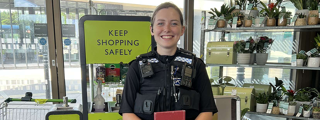Discover how Caitlin, Criminology alumna, entered the field, the diverse responsibilities of her role, and gain valuable advice for aspiring students looking to make a positive impact in policing.
How did you get into your current role?
Currently, I work as a neighbourhood officer on the problem-solving team for Thames Valley Police. I got into my current role through the Graduate Recruitment Bureau, which was recommended to me by BCU. I signed up with the bureau through LinkedIn, created a profile on their website, and took a quiz to explore potential career paths. They matched me with several careers that aligned with my profile, including the national graduate leadership program for the police. I applied to that program and a few others, eventually landing my current role.
What made you want to pursue a career in this field?
Initially, I was unsure about what I wanted to do after graduation, so I focused on finding graduate schemes that offered diverse opportunities. The graduate leadership program for the police appealed to me because it allowed me to experience various aspects of policing. I also felt a sense of pride in joining a profession that could make a positive impact. Policing has faced criticism recently, and I saw this opportunity as a way to restore public faith by being one of the good officers. Furthermore, I've always had a passion for helping people.
Could you give us a bit of an insight into what you do now?
My day-to-day responsibilities vary, which is one of the things I love about my job. During the ten weeks, I spent on shift, my work was more reactive, involving tasks such as assisting domestic violence victims, supporting individuals with mental health issues, and conducting suspect interviews.
Since transitioning to neighbourhood policing, my focus has shifted towards long-term solutions. I now work on addressing issues like exploitation, executing warrants, and securing remands. Currently, I'm involved in partnerships to safeguard young children, promote community positivity, and implement sustainable solutions. For example, I work on initiatives to help the homeless, aiming to reduce their involvement in long-term criminal activities like shoplifting and anti-social behaviour.
Criminology courses at BCU
Find more information about different Criminology related courses at BCU
What advice would you give to students aspiring to reach a similar position in their careers?
I would advise students to keep an open mind as there are various roles within policing, including civilian and officer positions. If you're looking for a fast-paced and comprehensive training program, the one I participated in is an excellent option. It involved eight weeks of training, followed by ten weeks on shift and two years in the neighbourhood. Additionally, consider exploring the different routeways offered by Thames Valley Police, as they provide diverse opportunities. Finally, remember that combining university studies with work can be challenging but rewarding, and having support from programs like mine can significantly enhance your career prospects.
Can you share any interesting stories from your job?
Every job in the police is interesting because we get a unique insight into people's lives and have the privilege of sharing their stories. One memorable and rewarding experience I had involved a lady in need of mental health support. She called the police while attempting self-harm with a knife in the shower. We had to break down her door, and I found myself negotiating with her in the shower, feeling an immense amount of pressure. Unfortunately, we had to use force to de-escalate the situation, but eventually, I managed to calm her down. We started talking, and I did everything I could to help her. To my surprise, she brought out her emotional support animal, which turned out to be a snake, adding a new element of fear to the situation. Eventually, we took her to a mental health facility, and she is now receiving the help she needs. This story is interesting because it highlights the value of effective communication and demonstrates how talking to someone can make a significant difference.
What's been the highlight of your journey from BCU to your career now?
One highlight of my journey has been the opportunity to continue engaging in amazing extracurricular activities while working. I enjoyed volunteering, travelling, and staying busy alongside my job. Being able to balance my work and personal interests has been a significant highlight for me.
Why should students learn policing academically rather than through academy/ training?
I believe it's essential for students to learn about policing academically because it provides them with a broader understanding of the field's historical context and the importance of maintaining legitimacy. Policing is currently facing challenges to its reputation, and having academic knowledge allows officers to navigate these complexities effectively. While practical training is crucial for gaining practical skills, having an academic foundation helps officers better understand policies and work with the public in the most effective and informed manner possible.
